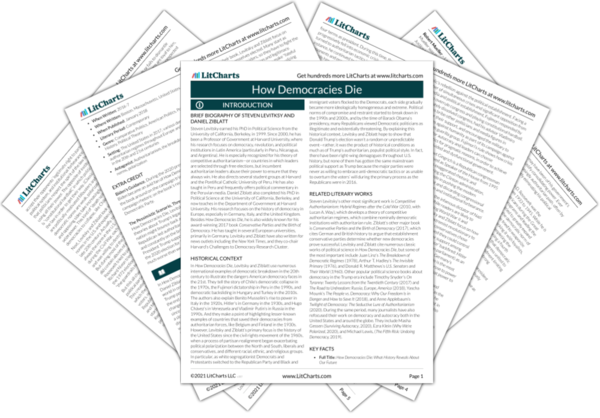Coup d’état Quotes in How Democracies Die
Blatant dictatorship—in the form of fascism, communism, or military rule—has disappeared across much of the world. Military coups and other violent seizures of power are rare. Most countries hold regular elections. Democracies still die, but by different means. Since the end of the Cold War, most democratic breakdowns have been caused not by generals and soldiers but by elected governments themselves. Like Chávez in Venezuela, elected leaders have subverted democratic institutions in Georgia, Hungary, Nicaragua, Peru, the Philippines, Poland, Russia, Sri Lanka, Turkey, and Ukraine. Democratic backsliding today begins at the ballot box.

Unlock explanations and citation info for this and every other How Democracies Die quote.
Plus so much more...
Get LitCharts A+Although some elected demagogues take office with a blueprint for autocracy, many, such as Fujimori, do not. Democratic breakdown doesn’t need a blueprint. Rather, as Peru’s experience suggests, it can be the result of a sequence of unanticipated events—an escalating tit-for-tat between a demagogic, norm-breaking leader and a threatened political establishment.
[…]
Many [demagogues] do eventually cross the line from words to action. This is because a demagogue’s initial rise to power tends to polarize society, creating a climate of panic, hostility, and mutual distrust. The new leader’s threatening words often have a boomerang effect. If the media feels threatened, it may abandon restraint and professional standards in a desperate effort to weaken the government. And the opposition may conclude that, for the good of the country, the government must be removed via extreme measures—impeachment, mass protest, even a coup.












